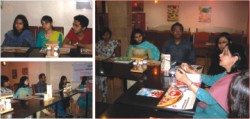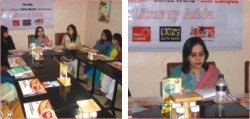Feature
Star Campus Literary Adda at
Coffee World returns
Sumaiya Ahsan Bushra
 IT was, once again, that time of the month for Star Campus (in association with Pizza Corner and Coffee World) to organise its monthly session of the 'Literary Adda' to enthral its readers with intellectual literary discussions. This month the discussion was held at Coffee World in Banani where Maleka Sarwar, a Senior Lecturer of the Department of English of North South University, Bangladesh talked about a compilation of short stories of 1971, titled 'Fault Lines' edited by Niaz Zaman and Asif Farrukhi. Students from different public and private institutions took part in the much anticipated discussion. The adda kicked off immediately after the arrival of the speaker with the participants eagerly awaiting the unveiling of the stories of reality and sufferings of the people stranded in the Liberation War of 1971 and relishing the prospect of the subsequent discussion of one of the most emotional topics of our history. IT was, once again, that time of the month for Star Campus (in association with Pizza Corner and Coffee World) to organise its monthly session of the 'Literary Adda' to enthral its readers with intellectual literary discussions. This month the discussion was held at Coffee World in Banani where Maleka Sarwar, a Senior Lecturer of the Department of English of North South University, Bangladesh talked about a compilation of short stories of 1971, titled 'Fault Lines' edited by Niaz Zaman and Asif Farrukhi. Students from different public and private institutions took part in the much anticipated discussion. The adda kicked off immediately after the arrival of the speaker with the participants eagerly awaiting the unveiling of the stories of reality and sufferings of the people stranded in the Liberation War of 1971 and relishing the prospect of the subsequent discussion of one of the most emotional topics of our history.
As the title suggests, 'Fault Lines' is a book that speaks about the divide that has been created between the Pakistanis and Bangladeshis as a result of the War of Independence of 1971. The war made the people of Bangladesh (the then East Pakistan) homeless, troubled and torn apart by violence and bloodshed while it portrayed the Pakistanis as heinous murderers to them. On the other hand, the people of Pakistan viewed the war as an act of betrayal on the part of the Bangladeshis (who were people from their very own country back then). As a result 'Fault Lines' or a natural divide has been created between the two countries and one which lasts even till this day. This book is a collection of short stories written by authors from both Bangladesh and Pakistan attempting to present the point of view of both sides. Originally the stories were written mainly in regional languages and later translated by various people into English and compiled thereafter.
“Fault Lines doesn't talk about fiction but mainly focuses on the crucial experiences faced by people. In fiction we look for the recreation of experiences and historical information is not present” Maleka Sarwar explained, while stressing that it was not a fictional book but rather an account of realities faced by people of that time.
“History is written down from the point of view of the writer” added Hasib Reza, one of the participants, in order to emphasize the fact that the historical accounts may vary marginally among the writers from the two countries.
 A collection of short stories namely- Bingo, Ghodra Camp, Accidental Death, Double War, The Travelers, along with several others were discussed while highlighting the perspectives of both Pakistanis and Bangladeshis. A collection of short stories namely- Bingo, Ghodra Camp, Accidental Death, Double War, The Travelers, along with several others were discussed while highlighting the perspectives of both Pakistanis and Bangladeshis.
Maleka Sarwar spoke about the shift in attitude of two friends, a Pakistani and a Bangladeshi as the war starts off while discussing the story Bingo by Tariq Rahman. She emphasized the perspective of the Pakistani writer and further describes the tone of the author to be remorseful as certain realizations occur to him after the occurrence of some brutal incidents.
“In the stories narrated by Pakistani writers we find a sense of loss, a constant search for an unknown element. They seem to portray the loss of millions of lives symbolically where the harsh reality is never revealed or acknowledged. However, when we compare it with the stories written by the Bangladeshi's we find pride and conscious awareness. The reason for the war, the reason for the loss of millions of lives”, expressed the Guest Speaker.
Maleka Sarwar, having experienced the war first hand, mentioned that the Pakistani Army Officials were always confused as to what the purpose for the bloody war was. They were clueless as to where it was going, and the torture and the humiliation of the Bangladeshi people were meaningless to them.
Intrigued by the heated discussion, Zahidul Karim of DU added, “The Pakistanis always took us to be the traitors; they believed that we were not fighting for a legitimate cause” one of the main reasons for the fault lines to occur as already revealed earlier.
Further discussions were on Ghodra Camp by Naeem Arvi, the story of a camp situated in the middle of a desert where the Bangladeshis, who were returning home in 1973, were trapped and tortured. The thought provoking story epitomizes the sufferings of the prisoners and their suppressed emotions.
In addition, a fresh new perspective (to draw a comparison with the Pakistani stories) was brought in through the reading of the story Double War by Selina Hossain, in which, the protagonist Nurjaan, a woman, fights for her country despite losing her dignity through the barbaric act of rape by the Pakistani forces. She becomes an internal spy for the muktibahini (Freedom fighters) and helps them with vital information regarding the enemy troops.
The Traveler by Gholam Mohammad also highlighted an important aspect of the war 'religion'. Many Pakistanis assumed Bangladeshis to be non-Muslims and often marked them to be Hindus - an assumption they used to justify (what they believed was) the betrayal of the Bangladeshis and the war. The mass killing of Hindus, the brutality and the terrorism by the Pakistani forces is pointed out in this short story.
“When we look closely at the two perspectives, of the two nations, we find a variety. We find some denying the damage caused and some repenting, whereas, on the other side, we find one unified pride to be a free nation” added one of the participants.
As the discussion progressed and the clock ticked by, it was time to bid goodbye. The intriguing and overly patriotic discussion came to a halt with the conclusion that, despite our differences as Bangladeshis and Pakistanis, one should move on and look into the future rather than dwelling on the past.
“The collection of 37 short stories in the 'Fault Lines' is an excellent read and it will open up a new window for the current generation allowing them to understand more about the Liberation War and see the comparisons which were depicted in certain cases,” said Maleka Sarwar.
Star Campus Literary Adda ended with a keen interest among the students to look forward to reading and learning about more stories on the significance of the Liberation War of 1971. But moreover, it capped off an evening filled with a surge of patriotism and rekindled a warm and ever blazing fire of love for our motherland.
Photos: Tanzina Rahman
| 